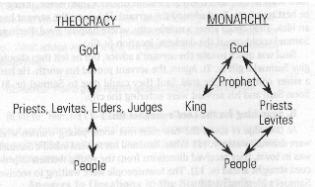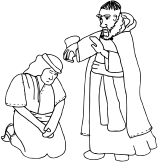1 Samuel
We Want a King!
7:15 - 9:27
Romans 12:2
And be not conformed to this world: but be ye transformed by the renewing of your mind, that ye may prove what is that good, and acceptable, and perfect, will of God
KJV
The believer should conform to the will of God rather than to the ways of the world.
related reading
Deuteronomy 17:14-20
Psalm 136:10-26
Matthew 2:1-15
Romans 11:1-6
Revelation 19:11-16
A father and son were both very stubborn and would never yield to anybody. One day the father had invited a guest to dinner, and told the son to go into the town and buy some meat. When he had done so, the son was just going through the city gate on his way home when he met another man face to face. Neither would give way, and there they stood, until at length the father went in search of his son. On seeing the boy, he said, “You hurry home with the meat. I will take over this fellow.”
—Chinese Humor
How often do our children follow our examples? Unfortunately, it is usually the bad characteristics they retain, not the good traits. On the other hand, we are not assured that our children will ever retain our good habits, traits, and characteristics. Sometimes the godliest people have the rottenest kids. Why do you suppose it turns out that way?
A Man Like Eli [7:15 - 8:10]
| Samuel has grown old, and with age, he repeats the mistakes of Eli. He has turned over his duties to his sons, Joel and Abijah. They are no better than the sons of Eli, at least in the eyes of the elders of Israel (8:3). The sons of Samuel are judges and are, thus, tempted by bribes to corrupt justice. Every job has its own temptations and strains toward corruption – even being a Christian! |  |
| Could one go so far as to say that every spiritual gift has its own temptations (see Romans 12:8)? |
For the elders of the different tribes of the Nation several reasons exists for their demand for a king. Samuel is too old. His sons are corrupt (8:5). There is a further hint of the need for military leadership (8:20). Note as you read through the text, that it is not just the elders who put forth this desire. And underneath all of these outward reasons lies one overpowering desire.
The Nation wants to be like the Jones’!
 |
Now make us a king to judge us like all the nations. 1 Samuel 8:5 |
The people are not content with God’s plan of rulership. Samuel has ruled the entire nation (cf. 7:3). Yet, his circuit riding cycle seems to be limited to the central area of the geographical Nation (7:16, 17). His sons, however, moved to Beersheba in the southern most part of Palestine. Even from this remote outpost, the elders had no stomach for the children’s method of government. Further, or notwithstanding this problem, the Nation was to be distinct from the pagan nations (Lev 20:26; Num 23:9). Desiring a king “like the nations” was not in keeping with this distinction. Remember, however, that Samuel’s role as a judge is not to create a dynasty.
 |
The role of the judges was God’s method of saving the people as He attempted to educate them. God commenced preparing the people for a king long before they came out of Egypt. Genesis 49:8-12 is a prophecy of a king to come out of the tribe of Judah. Balaam makes a similar prophecy as the Nation wonders the wilderness and draws near to the Promised Land (Num 24:15-19). God Himself indicates the time will come when a king will rule (Deut 17:14-20). 1 Samuel 8 becomes a literal fulfillment of this prophecy. |
The elders request “displeased Samuel” (8:6). A literal translation shows the extent of this displeasure. The request was “evil in the eyes of Samuel!”
God has provided the Scriptures to us as an example of both the good and the bad. Many godly people cross our paths every day. We should use these people as teachers of the way we should live and raise our children. Yet, Scripture is replete with examples of father’s who have failed to properly train up their children in the way they should go. Here, Samuel has fallen into this same trap. It is true that parents have no control over the final state of their children. But, parenting is a full time task and we must all be careful to follow the proper examples in performing this duty.
| Who do you use as your example? |
We Want a King! [8:11 - 22]
We saw earlier how God had left the Philistines in the land to act as a thorn in the side of the Israelites. We all have such thorns in our side – finances, business, jobs, spouses or other family members, health. Our task is to rely upon God, not upon a desire to be like our neighbors. It is this covetness and lust which becomes a major cause of our thorns. God, through Moses, had warned the Nation about the curses of worldly ways (Deut 26 - 30). Here, Samuel again speaks for God in warning the people about an earthly kingship (8:11-18). In fact, Samuel would repeat this warning a second and third time (10:17-19; 12:6-18)!
| How often are we warned of God’s will and ignore it? |
The kings of Israel would be “takers” not givers. This would be the result of the military and administrative bureaucracy that would be established under the kings. Taxes would be needed to support this structure. There heart would be in their wealth, their possessions, their women, and their military might.
Does this sound familiar to the modern ear? In what context? How often do we fail to follow God’s promise?
|
|
 |
And he said unto me, My grace is sufficient for thee: for my strength is made perfect in weakness. Most gladly therefore will I rather glory in my infirmities, that the power of Christ may rest upon me. 2 Corinthians 12:9 |
In looking for the contrasts of First Samuel, in these chapters we can notice the difference between the Nation and the prophet. James tells us to be swift to hear, slow to speak, and slow to anger (James 1:19). While the request for a king is upsetting to Samuel, he follows the pattern of James. Samuel turns to God in prayer (8:6,21). The people eyed the surrounding nations and wanted to be like them (8:19). In making its request, the Israelites were rejecting God! Paul tells us in Romans 1:21-32 that if we sin enough, God will turn us over to our sins until we are humbled. A less detailed description of this godly action is also found in Proverbs 1:22-33. What we frequently forget is that God remains in control, even when we are living in deep sin. Here the Nation turns their back on His kingship in favor of the ways of the world. God gives them their desire, but He controls the choice of the first king.
What if it is a church which falls into a low spiritual condition, similar to that of Israel? What is needed – an organizational change or a heart change? |
God’s plan of government is that of a THEOCRACY. What the people desired was a MONARCHY. While the players are the same, the relational structure is different as shown in this chart:

Samuel’s speech to the Nation shows just how costly this difference will be. A comparison of the reign of God with Moses as His leader (Exod 19:1-8) should be compared to that under Solomon (1 Kings 5:13-18).
We Meet Saul [9:1 - 17]
 |
Saul, the son of Kish, is introduced in Chapter 9. This chapter describes him as a man with world-like traits. He is the only king of Israel described as being tall (9:2), a trait normally reserved for the worldly kings. The listing of his genealogy (9:1) suggests wealth and prestige. This combined with his physical appearance would lead one to believe he is the ideal, favored man of God for the kingship. In fact, our introduction to Saul is that of an incompetent shepherd. He has misplaced his father’s donkeys and must set out on a search for them! |
But look at the negatives as they are developed in chapter 9. Saul lives almost next door to Samuel and did not know who he is (9:6, 18). He did not consider the idea of seeking spiritual help in his quest. Further, upon learning of his presence, Saul felt it necessary to pay (bribe?) him. Or did he merely feel prophets should receive a gift? Saul would further demonstrate an ignorance of the basic regulations of God in such areas as diet and military conduct. When, as king, Saul did institute reforms, he exempted himself from them!
And God remains firmly in control. As Saul and his servant come into the city, they “luck” upon some young maidens who “just” happen to know where Samuel is (9:11). Saul fails to see the divine appointment in this meeting. He came looking for Samuel and searched until Samuel finds him!
Despite all of Saul’s weaknesses, God points Saul out to Samuel as the first king of Israel (9:15-17). God remains ever in control. Jesus tells us that God is concerned about the birds of the air – and even more so about us (Matt 6:23-29). God is sovereign over all creation. His finger is in everything we do, if only we will open our eyes and see His efforts!
 |
The word “seer” (9:11) once meant the same thing as prophet. Prophets were frequently described as “seeing” (Isa 6:1; Jer 1:11). It is not unusual, then, that Saul’s servant would have suggested going to Samuel to find the donkeys. Samuel’s comments to Saul in 9:20 proves the validity of the suggestion. More is the pity that Saul did not have the spiritual knowledge to understand the potential of Samuel. |
| When did you last notice God’s finger at work in your life? |
Saul’s Anointing [9:18 - 10:1]
| Saul’s response to Samuel’s greeting expresses humility at this stage of the new king’s life (9:21). The humble protests do not stop Samuel from carrying out God’s command. Samuel anoints Saul in private (10:1), an action looking forward to Saul’s public coronation. |  |
 |
Anointing was the ancient ritual of consecration. The term anointed became a technical term for God’s chosen ruler. The task assigned to the king was to continue Israel’s cry (cf. 7:8) for God to hear and save the Nation, just as He had earlier heard the cries of the Nation in Egypt and saved them from their burdens in that foreign land. |
Soon, Israel would have its first king. Where would the king’s heart lie? In fact, where is the heart of the Nation? Would the king truly be anointed?
The Psalmist writes about the king of Israel in these terms:
 |
7 Lift up your heads, O ye gates; and be ye lift up, ye everlasting doors; and the King of glory shall come in. 8 Who is this King of glory? The LORD strong and mighty, the LORD mighty in battle. 9 Lift up your heads, O ye gates; even lift them up, ye everlasting doors; and the King of glory shall come in. 10 Who is this King of glory? The LORD of hosts, he is the King of glory. Selah. Psalm 24:7-10 |
The Lord of host, Jehovah Almighty, is the true king of Israel! This title properly belongs to Jesus Christ as Lord of Lords and King of Kings (Rev 19:11).
![]()
 |
This is all a condition of the heart – for better or worse. Where does your heart stand on the issue of control. Just as a king, your heart should be in line with God’s plan for your life – physically, morally, and spiritually. |
 |
15 Love not the world, neither the things that are in the world. If any man love the world, the love of the Father is not in him. 16 For all that is in the world, the lust of the flesh, and the lust of the eyes, and the pride of life, is not of the Father, but is of the world. 17 And the world passeth away, and the lust thereof: but he that doeth the will of God abideth for ever. 1 John 2:15-17 |
Is your life in line? Where is your heart? Who is your king? |
